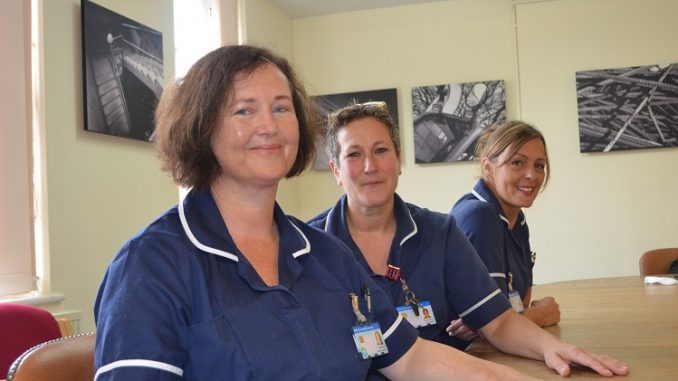
A dedicated team of specialised nurses at Margate’s Queen Elizabeth The Queen Mother Hospital is helping patients to tackle their reliance on alcohol and other drugs – saving lives, bed space and NHS resources.
The alcohol and substance misuse team is called in to see a patient if alcohol or drugs are seen as the underlying reason for a hospital admission.
Team leader Julie Blake said: “A retired person may be admitted to our A&E because of a serious fall at home, but sometimes the reason for repeated falls and admissions to hospital is alcohol. They may not necessarily be an alcoholic, but they may be drinking to excess and this could be negatively influencing their health and wellbeing.”
Julie and her team never judge their patients.
Julie said: “We’re not pointing fingers – we have to be totally non-judgmental. Instead, we have to understand the groups we’re dealing with.”
All walks of life
Over the past three years, Julie and her nursing colleagues, Janet Llewellyn and Kelly Rook, have had to intervene in the lives of those affected by drugs too. The people they see come from all walks of life.
Julie said: “Patients have been admitted to the hospital one way or the other and we’re made aware that they may have a problem and need some help.
“Many patients have attended the hospital via A&E, or they may already be an in-patient admitted for one reason or another. At times, we are asked to see those patients, some who are under the age of 18, for drink and drug related-issues. Those who have mental health problems have complex needs and require assessing with the in-hospital psychiatric services.
“At times it might be an elderly lady who lives alone and drinks brandy in the evening, which leads to a fall. Or it might be a young man who’s mixed cocaine and alcohol, not realising that if you do that, the liver produces cocaethylene, which is another toxin his body has to deal with.”
There is not a ‘typical’ person whose life has been negatively affected by alcohol and drugs.
Pilot scheme
Established in 2014 in Margate, a two-year alcohol and substance misuse pilot study was originally invested in by Kent County Council and based on national and Thanet-specific alcohol abuse data.
Senior clinical input came from consultant gastroenterologist Dr Anne Ballinger, with nursing input from senior matron for medicine, Sally Moore, for the division of urgent care and long-term conditions.
Julie said: “The pilot scheme was set up so that we could help patients with harm reduction and help them to link with outside agencies.”
Continuing the work
Since then, the local authority funding has ended, but the work of Julie and colleagues continues.
Julie said: “By intervening and using evidence-based practice we can reduce the levels of agitation that some patients display when they are withdrawing from alcohol. It’s hoped that we may also be able to prevent long-term health conditions developing.”
Harm reduction works best if patients are willing to change their way of thinking and are willing to engage with external services after being discharged from hospital. Taking ownership of their own substance dependency and recognising they have a problem, is important in preventing lapse and relapses.
Contemplating the previous fortnight’s work, Julie added: “We’ve saved more than 31 bed days over the last nine days due to outpatient detox and safe early discharge due to adequate and safe detox.”
Putting lives back on track
The statistic is simple, money is saved and NHS resources protected. Of equal importance, a previously shattered life may begin to be put back together again.
Once a patient receives a visit from Julie and her colleagues, significant and positive steps can be made. When the acute phase is over, which may require detox, recovery is the goal.
Sometimes the intervention may be basic, but can end up saving a person’s life. Patients who have Wernicke-Korsakoff syndrome (an alcohol-associated neurological disease) may need immediate help with vitamin B1 being administered.
For those whose condition is indicative of alcohol misuse an Alcohol Use Disorders Identification Test (AUDIT) is carried out. This is a screening tool (developed by the World Health Organisation) to assess alcohol consumption, drinking behaviour and alcohol-related problems.
Support outside the hospital
Prior to discharge patients can be referred to outside agencies, for further rehabilitation and ongoing counselling.
Julie said: “If a patient is homeless, the team can put them in touch with charities which support those vulnerable individuals. But we also must be mindful that for some, being homeless is a way of life and it’s the life they choose to live.
“Working collaboratively with other services within the hospital such as the care navigators, helps in giving the best possible advice on shelters, especially in the winter months, and contact points for a warm meal and shower. For those who would like to move away from opioid addiction, links are forged with community services to enable opioid substitutes to be prescribed.”
Feedback
Julie and her colleagues have seen more than 758 patients at the QEQM site this year, up to November 2017, and of these more than 100 have been referred to the community alcohol and drug services locally. Poignant feedback forms contain hand-written testaments to the gratitude that patients feel for their care. Simple but eloquent and overwhelmingly powerful, one feedback form represents a life changed.
“Seeing a former dependent drinker or opioid abuser move on and actively change their life is the biggest thank you a person can have,” said Julie.
Feature by Steve James

